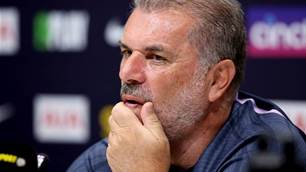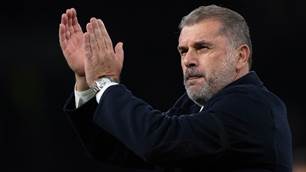WHY Arsenal simply cannot afford to lose their midfield maestro – arguably their greatest ever – to his original stomping ground of the Nou Camp in Spain.
On a balmy North London evening last September, Francesc Soler Fabregas showed precisely why the world's greatest team are quite so keen to sign him. The Barcelona directors will have been drooling as they watched the Spanish midfielder score twice and set up two goals as Arsenal put Braga to the sword 6-0.
This was an individual performance so sparkling it had The Daily Telegraph's Henry Winter purring. "Fabregas was particularly immense, always at the heart of the action, always conducting the Arsenal orchestra like a maestro," he wrote. "Such a virtuoso display simply reminded a bewitched audience how vital it had been that Arsenal resisted Barcelona's summer courtship of their captain. As if they needed reminding."
Of course the Emirates faithful didn't need reminding. Last summer, they watched their No.4 lay on the winner for Iniesta as Spain triumphed over Holland in the World Cup final. Fabregas has now won the World Cup and European Championship with Spain - yet he has still to win a medal with Arsenal since a lucky FA Cup victory over Manchester United in 2005. It can only be a matter of time before he outgrows the club. Some would say he already has.
At just 23, Fabregas is the greatest midfielder who has ever played for Arsenal - surpassing even the magnificent Liam Brady. The question now is whether he can become the greatest in the world.
That's not mere hyperbole. Those closest to him go even further with their praise of the star midfielder. When Arsene Wenger first signed the youngster in 2004 he described him to Arsenal's goalkeeping coach Bob Wilson as "the best 17-year-old player I've ever seen." "But wasn't Pele the best 17-year-old?" Wilson asked. "I am telling you about a player who plays in a different role to Pele," said Wenger. "Pele was a striker, not a creator."
Three years later, with Fabregas barely out of his teens, Wilson confirmed the player was a match for any of the Gunners' greats. "Cesc has Dennis's [Bergkamp] brain," he said, "the combativeness and touch of Patrick Vieira, the marauding spirit of Rocastle and Thomas, and the magic wand of Liam Brady's left foot, only in his right boot. I can't praise him enough; he's up there with the best of them."
Each season, the weight of expectation seemed to grow lighter on Cesc's broadening shoulders. Every term he has developed as a player. To his superlative ability to create goals, he has added a burly strength and the icy temperament required to score them too. Last campaign saw his best haul yet, contributing 15 assists and 19 goals.
"I believe he is more relaxed - there is less tension in his finishing," explained Wenger. "Also he has gained more physical power. You can see he resists much more the runs of his opponents." Wenger's change of tactics from 4-4-2 to 4-3-3 also played a significant part in liberating his captain by reducing the player's defensive responsibilities and allowing him to play further up the pitch.
Continues on next page...
The new system offers Arsenal the fluidity that their pass-and-move game requires. While Fabregas is allowed to buzz around the pitch, Alex Song and one other from Diaby, Denilson and Wilshere are tasked with holding the fort. The new formation works because Fabregas is so gifted at finding space and picking out his team-mates with those typically perfect-weighted passes.
Cesc clearly enjoys the attacking opportunities his new role offers - although he does admit missing the rough and tumble midfield action. "When I started at Arsenal we were playing 4-4-2, I was one of those two in the middle so I could come very deep to get the ball," he explains. "Now my position is higher up on the pitch, sometimes I don't touch the ball as often as I used to, so I have to be patient. But I know I'm in this part of the pitch where I can do dangerous things in terms of giving the final ball, and I have more time to go to dangerous positions to score a goal as well."
When you build a team and a formation around a player, there's always going to be a problem when that player isn't there. Over the last three seasons, Cesc has had his fair share of injuries although Arsenal are fortunate enough to have enough talented players who can fill in. Nasri, Rosicky, Arshavin, Diaby, Wilshire and Ramsey are all equipped to step into Cesc's size nines when required. However, the truth is, none can yet dictate a game or pick a stubborn defence's lock quite like the skipper.
The real problem will arise should Barcelona finally get their way and bring their prodigal son back home. Statistics reveal that the Gunners rely on their mini maestro to an alarming extent. If you are an Arsenal fan then the following figures should probably be fitted with a health warning. Of the last 50 games, Fabregas has played 30: Arsenal have won 67 per cent of these, drawn 10 per cent and lost 23 per cent. In his absence, the team have managed to win just 50 per cent of their games, drawing 25 per cent and losing the rest. Without Fabregas, Arsenal's average points per game drops from 2.1 to 1.75 - extrapolate this over 38 games and the Gunners would have ended last season with just 67 points - battling it out with Manchester City for a spot in the Europa League instead of a title charge.
Stats don't tell you everything; after all, Samir Nasri and Jack Wilshire have made giant strides this season and would, you imagine, continue to blossom should they be given the responsibility in Cesc's absence.
Furthermore, if Fabregas did leave for Barca it wouldn't be cheaply. Wenger could always use the cash to strengthen his side's leaky defence. A reliable new goalkeeper would go a long way to helping the side.
Tottenham and Manchester City, however, are circling Arsenal like vultures and the loss of Fabregas would only serve to hearten them. Without the Gunners' captain and most valuable player, you suspect the task of securing Champions League football may just prove a bridge too far for them next season. Unless, of course, Wenger pulls another rabbit out of the hat. After all, before he plucked him from The Masia who had ever heard of Francesc Soler Fabregas?
This article appeared in the February 2011 issue of Australian FourFourTwo magazine. To buy back copies of this issue call 03-8317-8121 with a credit card to hand.
Related Articles

Postecoglou looking to A-League to 'develop young talent'
.jpeg&h=172&w=306&c=1&s=1)
Big change set to give Socceroos star new lease on life in the EPL













